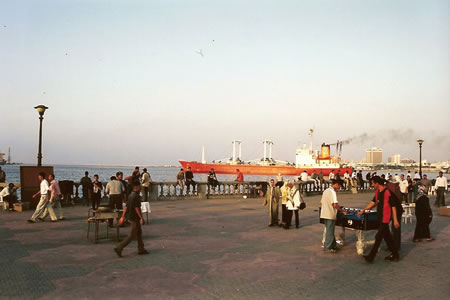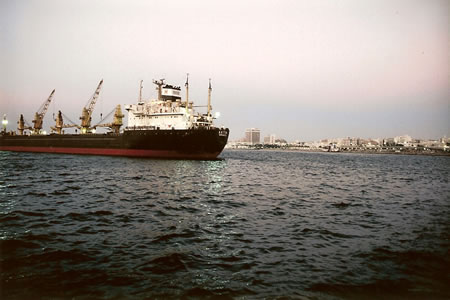English | Dutch |
|
| Scary moments in Tripoli | |
Tripoli (Libya), July 15th 1999 |
|
It is the summer of 1999 and we take a stroll over the boulevard of Tripoli, the capital city of Libya. These are our last days in Libya. We had a great time making the journey to the south of the country, for a terrific visit to the Akakus Mountains. Our last days, are days to relax in Tripoli and to buy some souvenirs for family and friends. We planned these days to be the most relaxed days of our trip.
Tripoli is a nice city to stay. The city is easy to navigate, the people are easy going, and it is beautifully situated along the Mediterranean coast. The boulevard is pleasant, especially at the end of the day when the heat is gone and many people come to the boulevard for a stroll and to enjoy the cool breeze of the sea. There are several fairground attractions and people that sell food and drinks to earn some extra money. The boulevard gives a beautiful view over the harbor and is the perfect place to enjoy the sunset. |
|
 |
|
People on the boulevard of Tripoli looking for some cooling down |
|
| We wait 20-30 minutes. One guys comes out of the office and requests us to come back in one hour. We decide to take a drink in the passenger terminal. Of course, we return exactly in one hour. We are surprised to hear that we do not get back our passports and camera yet. In very bad English they tell us that they are going to check what the content is of the film. If there is nothing ‘wrong’ (read: ships and other harbor equipment) on the film, we are free to go and will get back the passports, photo camera, and developed and printed photos. We are asked to come back in 2 days!
This is the moment when we really get concerned. We made the pictures because of the nice sunset, but the photos do show also some ships and harbor cranes. The two next days are the longest days in our lives. These two days look like two months. Without the passports we cannot leave the city, not to mention the country. There is no embassy of our country in Libya, which means that we are completely on our selves. Two days long, we didn’t do anything. We just waited the two days to end. We also decided not to communicate to friend and family at home, to prevent panic situations. After two long days we walk back to the passenger terminal where we left our passports and photo camera two days earlier. A man is waiting for us and asks us to follow him. We are surprised when we leave the building again. We are walking to an old Mercedes Benz (from the 70’s) with chauffeur and running engine. The man requests us to get in the car. We are in a doubt for a second, but decide to comply with his request. Our worries increase by the minute. After all, why should we have to go with them if nothing is wrong? The car starts driving. We drive through the city and after 10 minutes we approach a big rusty fence. It seems to be the entrance of an old and restricted part of the harbor. The story starts looking like a bad ‘B-movie’. From now on, the gods will decide about our destiny. A guard opens the fence. The car starts driving deeper and deeper into the harbor area. After a couple of minutes, the car stops at an old building. We get out of the car and follow the man into the building. Via an old and musty stairwell we reach the first floor. We are walking through a dark hall till we reach the end. The building looks like an office of the secret service of Libya. At the end of the hall is a small room. There is no furniture in it. The man asks us to wait. Our harts beat in our throat. We are in a very bad position. We are deep in a harbor area, nobody knows where we are, and on our films are ships and harbor cranes. All ingredients are present for a long stay in a Libyan prison. | |
 |
|
Taking pictures in the harbour of Tripoli is not recommended |
|
| After approximately 5 minutes, the man is entering the room again. He has our passports and the camera in his hand. He hands everything over and asks us to follow him again. We get in the Mercedes again and leave the harbor area a couple of minutes later. The car stops in the city center and the man signals us that we can leave the car. We get out as soon as we can, we close the door, and the car disappears in the traffic. We are dazed and take a short rest on one of the benches along the road.
We do not know what happened, and why we are ‘free’ again. After some reflection on what happened, we can think of only one possibility. Probably, the Libyan people used the process for processing regular films, while we used a slide film. If they did try to develop the slide film on the way you develop regular films, the slide film is ruined and they will never know what was on the slide film. This scenario is supported by the fact that we did not get our developed slides back from them, whilst the fact that they promised. Next day we decided to leave the country as soon as possible. You never know if somebody changes his or her mind. | |